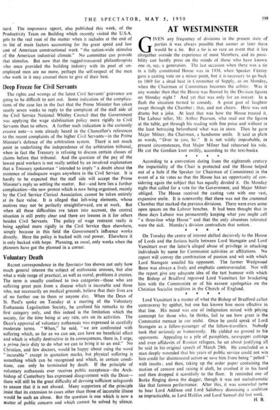AT WESTMINSTER
GEVEN any frequency of divisions in the present state of parties it was always possible that sooner or later there would be a tie. But a tie is so rare an event that it lies altogether outside the experience of most Members, and its possi- bility can hardly press on the minds of those who have known one in, say, a generation. The last occasion when there was a tie in a fully constituted House was in 1938, when Speaker Fitzroy gave a casting vote on a minor point, but it is necessary to go back to 1869 for a dead heat in Committee of Supply, as on Monday, when the Chairman of Committees becomes the arbiter. Was it any wonder then that the House was floored by the Division figures on Monday night ? And yet that was only for an instant. In a flash the situation turned to comedy. A great gust of laughter swept through the Chamber ; that, and not cheers. Here was not drama but a joke. At least that was how the House treated it. The Labour teller, Mr. Arthur Pearson, who read out the figures at the table, got through his reading with fine poise and without in the least betraying beforehand what was in store. Then he gave Major Milner, the Chairman, a handsome smile. It said as plain as words, " Over to you, Sir." It is not wildly improbable, in present circumstances, that Major Milner had rehearsed his role. He cut the Gordian knot swiftly, according to the text-books.
* • * • According to a convention dating from the eighteenth century the impartiality of the Chair is protected and the House helped out of a hole if the Speaker (or Chairman of Committees) in the event of a tie votes so that the House has an opportunity of con- sidering again the subject that has equally divided it. On Monday night that called for a vote for the Government, and Major Milner obliged. The House received the casting vote with one vast, expansive smile. It is noteworthy that there was not the crammed Chamber that marked the previous divisions. There were even some open spaces on the Labour benches. It had been thought that in these days Labour was permanently keeping what you might call " a three-line whip House " and that the only absentees tolerated were the sick. Monday's division contradicts that notion..
* * * * On Tuesday the centre of interest shifted decisively to the House of Lords and the furious battle between Lord Stansgate and Lord Vansittart over the latter's alleged abuse of privilege in attacking individuals by name for Communist activities or affiliations. No report will convey the combination of passion and wit with which Lord Stansgate assailed his opponent. The former Wedgwood Benn was always a lively and emphatic controversialist. Nor will the report give any adequate idea of the tart humour with which the Bishop of Bradford reproved Lord Vansittart for bracketing him with the Communists or of his earnest apologetics on the Christian Socialist tradition in the Church of England.
* * * * Lord Vansittart is a master of what the Bishop of Bradford callea controversy by epithet, but one has known him more effective in that line. His mood was one of indignation mixed with pitying contempt for those who, he thinks, fail to see how great is the Communist menace in our midst. Once he could speak of Lord Stansgate as a fellow-passenger of the fellow-travellers. Nobody took that seriously or humorously. He yielded no ground to his opponents. Appealing to a pile of pamphlets, newspaper cuttings and even affidavits of Russian refugees, he set about justifying all he said in his original speech of March 29th. He concluded as a man deeply wounded that his years of public service could not win him credit for disinterested action or save him from being " pelted " with insults ; and then, taking up the order paper containing the motion of censure and raising it aloft, he crushed it in his hand and then dropped it scornfully to the floor, It reminded one of Burke flinging down the dagger, though it was not melodramatic like that famous performance. After this, it was somewhat tame to hear Lord Addison and Lord Salisbury dismissing a coalition as impracticable, as Lord Halifax and Lord Samuel did last week.
H. B.






































 Previous page
Previous page